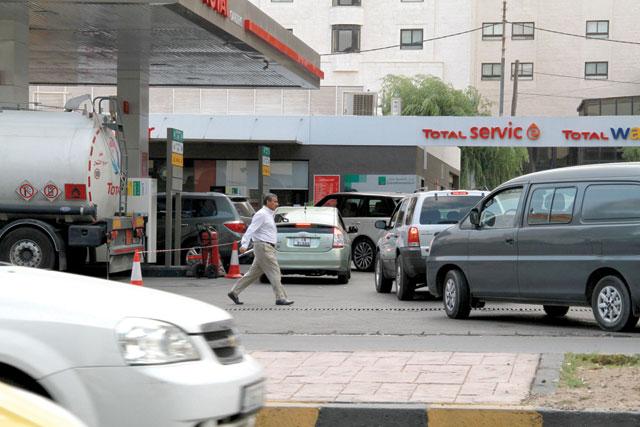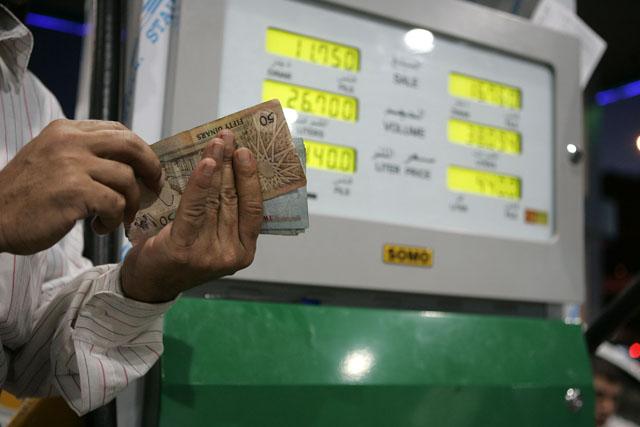You are here
Jordanians expect ‘substantially’ lower fuel prices as winter approaches
By Omar Obeidat - Oct 19,2014 - Last updated at Oct 19,2014

AMMAN – The drop in international oil prices is good news for Jordanians, if it is reflected “fairly” on domestic fuel prices.
The fall in the price of Brent crude to its lowest level since late 2010 has prompted many Jordanians to hope the pace of the decline internationally would be reflected in the domestic market by the end of this month as the government is set to update fuel prices.
The government pricing mechanism at the end of every month takes into account the average global prices of Brent crude oil and ready-to-use fuel products during the month before.
International benchmark Brent oil for November delivery was traded around $83 per barrel over the past week but bounced back by the end of the week to around $86 a barrel.
When the government lowered the prices of oil derivatives in the domestic market for October taking the price of Brent crude oil as a factor in its pricing strategy, the price of Brent –– a benchmark for international oils –– was $97 per barrel during September.
Several people interviewed by The Jordan Times on Sunday said that they had been following the prices of oil on global markets.
“Hopefully prices of fuel products in Jordan would go down sharply in the next pricing update as winter is approaching,” said Roaa Majali. “Fuel is a concern for Jordanians especially in winter and the government should take that into consideration,” the employee of a public relations company said, indicating that she checks international oil prices online on daily basis.
Fuel prices in Jordan are “expensive” and do not match the average income of the majority of people, Majali said, adding that she does not own a car because of the fuel bill.
Oil prices plunged by nearly 15 per cent over the past two weeks and consumers in Jordan should see a similar drop here, said Ahmad Habboub.
As an insurance company employee whose work is mainly in the field, Habboub said that he traded his fuel engine car for a hybrid motor to cut down his monthly fuel cost.
“If price keeps dropping or remains stable at current levels, fuel prices in the local market should at least drop by 10 per cent,” he hoped.
The remarks of Majali and Habboub were also echoed by Huthaifa Mohiddine, who expected fuel prices in the Kingdom to go down tangibly in the next update.
Mohiddine said that many people are watching international oil prices to see if the government would reflect them here.
But Fahed Al Fayez, president of the Gas Station Owners Association, said it is still early to predict the percentage of the drop in fuel prices in the November modification.
Many people predict a tangible decline locally but if prices in the global markets rebound or surge sharply in the coming 10 days this could affect the pricing decision by the government, Fayez said, who explained that Brent crude is only a benchmark in the pricing strategy and not a main factor.
The government’s pricing committee takes into account the prices of ready-to-use fuel products in addition to other factors that include shipment and refining costs, he said, noting that Jordan imports nearly 60 per cent of oil needs as crude while the remaining 40 per cent comes as final products.
Fayez said the special tax imposed by the government on fuel products is another reason that makes the prices of the commodities expensive.
He cited a 40 per cent special tax on the 95-octane gasoline, while the 90-octane is subject to a 26 per cent levy.
Kerosene and diesel are subject to a 6 per cent tax.
Head of the Lower House’s Energy and Mineral Resources Committee Jamal Gammoh told The Jordan Times that he expects the drop in oil prices globally to be reflected on the domestic market at the end of the month.
“As an observing member on the pricing committee I would say prices here would go down substantially,” the lawmaker said.
A government official familiar with the pricing process, who requested anonymity, agreed that consumers would see a substantial drop in oil prices by the end of October, but nothing is final as there are still around 10 days to go before the government committee does the math.
Currently, one litre of unleaded 90-octane gasoline is sold at JD0.79, while one litre of 95-octane costs JD0.96. The prices of diesel and kerosene are JD0.63 per litre.
Related Articles
Fuel prices are expected to drop by 8 to 10 per cent on February 1, a government official told The Jordan Times Wednesday.
Prices of diesel and kerosene products are expected to witness a bigger drop than that of petrol in the next government pricing update for fuel set to be announced on Friday, an informed source said Sunday.
Fuel prices are expected to drop by up to 5 per cent in the domestic market as of Monday, Gas Stations Owners Association (GSOA) President Fahed Al Fayez said Saturday.

















